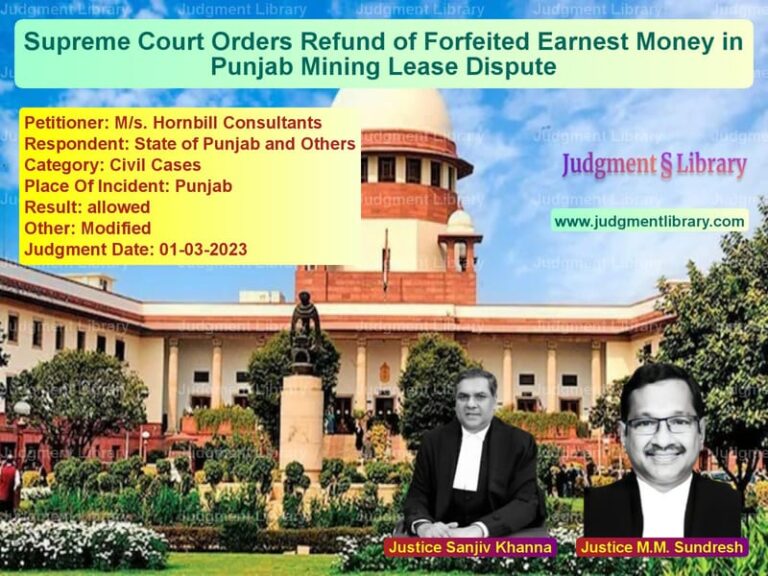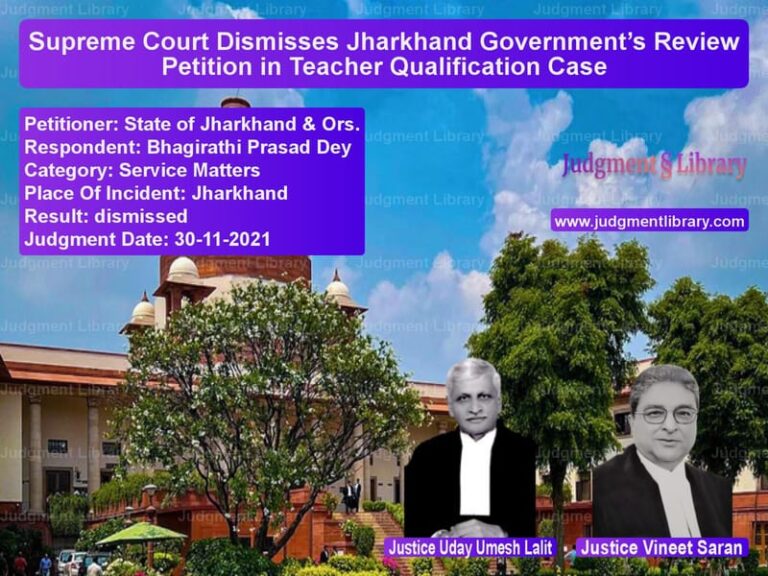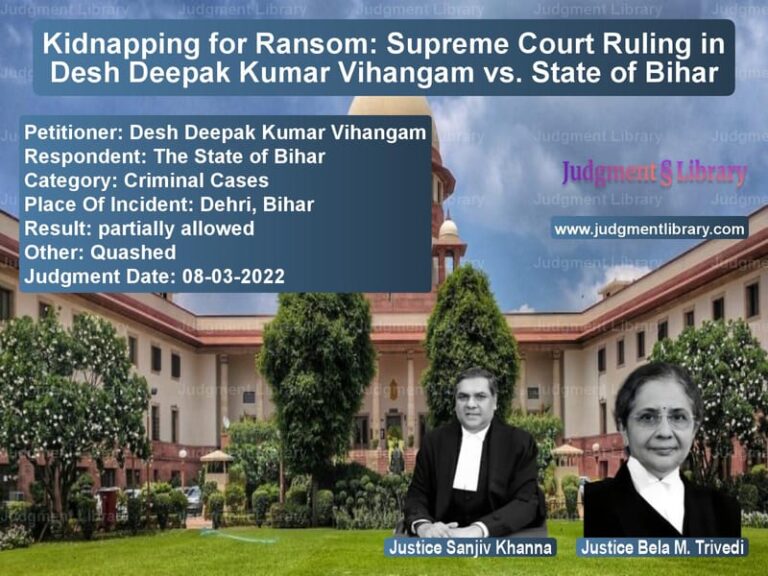Supreme Court Rules Against Lapse of Land Acquisition Under Section 24(2)
The case of Government of NCT of Delhi & Anr. v. Manjeet Kaur & Anr. revolved around whether land acquisition proceedings under the Land Acquisition Act, 1894, had lapsed due to non-payment of compensation, as per Section 24(2) of the Right to Fair Compensation and Transparency in Land Acquisition, Rehabilitation and Resettlement Act, 2013. The Supreme Court had to decide whether the High Court was correct in ruling that the acquisition had lapsed.
In a landmark judgment, the Supreme Court set aside the High Court’s ruling, emphasizing that land acquisition does not lapse merely due to non-payment of compensation if possession has been taken and the amount has been deposited with the government. The decision reaffirms the Constitution Bench ruling in Indore Development Authority v. Manoharlal, clarifying the interpretation of Section 24(2).
Background of the Case
The land in question, located in Village Satbari, New Delhi, was acquired under the Land Acquisition Act, 1894, for development purposes. The acquisition process was challenged by Manjeet Kaur, the respondent, who claimed that the proceedings should be deemed to have lapsed as per Section 24(2) of the 2013 Act.
The Delhi High Court ruled in favor of the respondent, holding that since neither possession had been taken nor compensation had been paid, the acquisition had lapsed. The Government of NCT of Delhi challenged this decision before the Supreme Court.
Arguments by the Parties
Arguments by the Appellant (Government of NCT of Delhi)
- The government argued that possession of the land had not been taken due to pending litigation and stay orders.
- The compensation had been deposited in the government treasury, which should be considered as compliance with the acquisition process.
- The High Court had erroneously relied on the overruled decision in Pune Municipal Corporation v. Harakchand Misirimal Solanki, which had previously held that non-payment of compensation leads to lapse of acquisition.
- The case should be governed by the Constitution Bench ruling in Indore Development Authority, which clarified that acquisition does not lapse if compensation is deposited and possession is taken.
Arguments by the Respondent (Manjeet Kaur & Anr.)
- The respondent argued that they had never received compensation for the acquired land.
- The government had failed to physically take possession of the land, making the acquisition incomplete.
- The High Court was justified in ruling that acquisition had lapsed due to non-compliance with Section 24(2).
Supreme Court’s Legal Analysis
Overruling of Pune Municipal Corporation Case
The Supreme Court highlighted that the High Court relied on an overruled precedent. The Constitution Bench in Indore Development Authority explicitly clarified that the deemed lapse of acquisition occurs only if both possession has not been taken and compensation has not been paid.
Clarification of Section 24(2)
The Supreme Court reaffirmed the findings in Indore Development Authority:
“If possession has been taken but compensation has not been paid, or if compensation has been paid but possession has not been taken, then acquisition does not lapse.”
Role of Compensation Deposits
The Court ruled that depositing compensation in the government treasury constitutes compliance with the acquisition process, provided the landowner was notified of the deposit.
“Once compensation has been deposited in the treasury, the obligation to pay is complete. Non-acceptance by the landowner does not invalidate the acquisition.”
Impact of Stay Orders on Possession
The Court noted that possession could not be taken due to ongoing litigation. It held:
“If possession could not be taken due to a court-ordered stay, the delay cannot be used as a ground to claim lapse of acquisition.”
Final Judgment by the Supreme Court
The Supreme Court ruled:
- The High Court’s judgment was quashed.
- The acquisition proceedings were held to be valid.
- The landowner’s writ petition before the High Court was dismissed.
- The government’s appeal was allowed.
Impact of the Judgment
- Strengthens Land Acquisition Policies: The ruling ensures that technical objections do not hinder government development projects.
- Prevents Misuse of Section 24(2): The decision clarifies that landowners cannot delay compensation collection and later claim lapse of acquisition.
- Aligns with Constitution Bench Ruling: The judgment follows Indore Development Authority, providing legal consistency.
Conclusion
The Supreme Court’s ruling in Government of NCT of Delhi v. Manjeet Kaur ensures clarity in the application of Section 24(2) of the 2013 Act. By holding that acquisition does not lapse if possession is taken or compensation is deposited, the Court has reinforced the principle that procedural delays should not disrupt legally concluded acquisitions.
Petitioner Name: Government of NCT of Delhi & Anr..Respondent Name: Manjeet Kaur & Anr..Judgment By: Justice M.R. Shah, Justice C.T. Ravikumar.Place Of Incident: Delhi.Judgment Date: 13-03-2023.
Don’t miss out on the full details! Download the complete judgment in PDF format below and gain valuable insights instantly!
Download Judgment: government-of-nct-of-vs-manjeet-kaur-&-anr.-supreme-court-of-india-judgment-dated-13-03-2023.pdf
Directly Download Judgment: Directly download this Judgment
See all petitions in Property Disputes
See all petitions in Landlord-Tenant Disputes
See all petitions in Judgment by Mukeshkumar Rasikbhai Shah
See all petitions in Judgment by C.T. Ravikumar
See all petitions in allowed
See all petitions in Quashed
See all petitions in supreme court of India judgments March 2023
See all petitions in 2023 judgments
See all posts in Civil Cases Category
See all allowed petitions in Civil Cases Category
See all Dismissed petitions in Civil Cases Category
See all partially allowed petitions in Civil Cases Category







